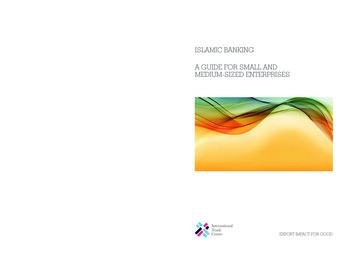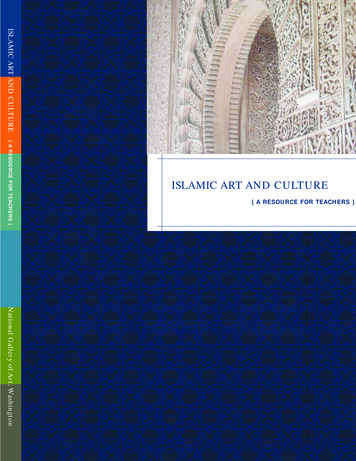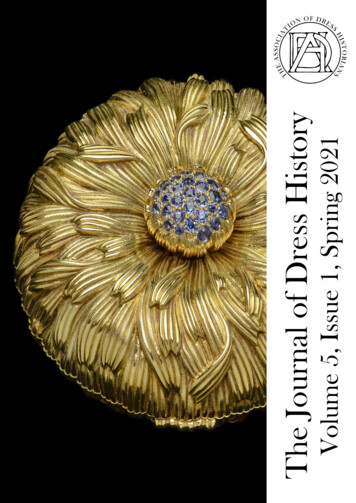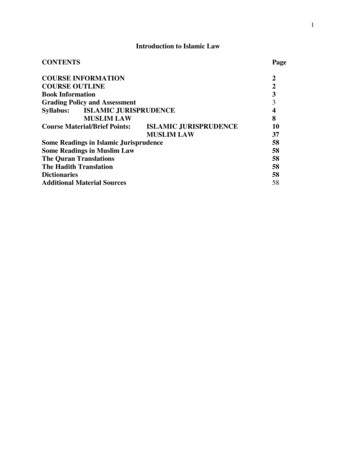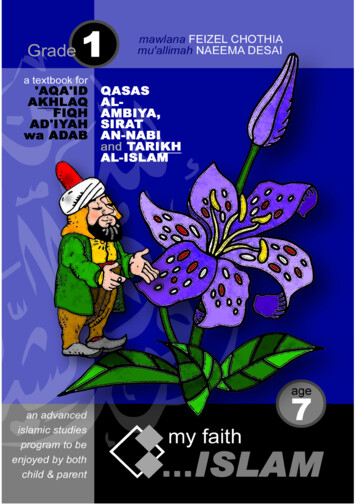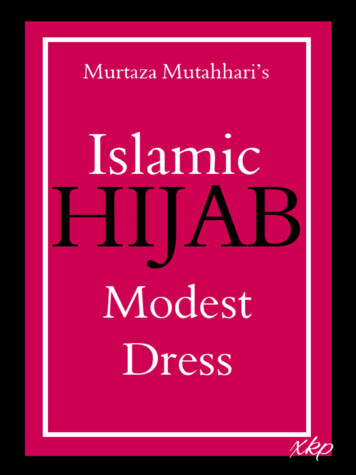
Transcription
Part 1Introduction2
Chapter1The Word hijab (Modest Dress)We believe in a particular philosophy in Islam for woman's hijab or modest dress which forms our intellectual point of view and in regard to analysis, it can be called the basis for the Islamic modest dress.Before we begin our discussion, it is necessary to look at the meaningof the word hijab which is used in our age to refer to a woman's covering.This word gives the sense of 'covering' because it refers to a veil or ameans of 'covering' . Perhaps it can be said that because of the origin ofthe word, not every covering is hijab. That 'covering' which is referred toas a hijab is that which appears behind a curtain. The Holy Quran describes the setting of the sun in the story of the Prophet Solomon, " until the sun was covered (bil hijab) and time for the afternoon ritual prayerwas over." (38:32) The diaphragm separating the heart from the stomachis also called 'hijab'.In the advice given by Imam Ali to Malik Ashtar, he states, " prolong not your seclusion (hijab) from your subjects, for a ruler's seclusionfrom his subjects is a kind of constraint and (results in) a lack of knowledge of affairs. Seclusion from them cuts rulers off from the knowledgeof that from which they have been secluded. [1]Ibn Khaldun says in the Muqaddimah, "Governments do not consider aseparation to exist between themselves and the people at the beginningof their formation but little by little, the separation and distance betweenthe ruler and the people grows and finally it causes unpleasant results."[2] Ibn Khaldun used the word hijab in the sense of meaning 'curtain' and'separation' and not 'covering'.The use of the word satr, in the sense of 'covering' was used instead ofhijab, especially by the religious jurisprudents. The religious3
jurisprudents, whether in the section on the ritual prayers or inthe section on marriage, refer to this issue and use the word satr and not hijab.It would have been best if the word had not been changed and we hadcontinued to use the word 'covering' or satr because, as we have said, theprevalent meaning of the word hijab is veil. If it is to be used in the senseof 'covering', it gives the idea of a woman being placed behind a curtain.This very thing has caused a great number of people to think that Islamhas wanted women to always remain behind a curtain, to be imprisonedin the house and not to leave it.The duty for covering, which has been established for women in Islam,does not necessarily mean that they should not leave their homes. It isnot the intention of Islam to imprison women. We may find such ideas inthe ancient, pre-Islamic past of some countries like Iran or India but nosuch thing exists in Islam.The philosophy behind the hijab for woman in Islam is that she shouldcover her body in her associations with men 'whom she is not related toaccording to the Divine Law' (na-mahram) and that she does not flauntand display herself. The verses of the Holy Quran which refer to this issue affirm this and the edicts of the religious jurisprudents confirm it.We will refer to the extent of this covering by using the Quran and theSunnah as sources. The relevant verses do not refer to the word hijab.Verses which refer to this issue, whether in Surah Nur (Chapter 24) orSurah Ahzab (Chapter 33), have mentioned the extent of the coveringand contacts between men and women without using the word hijab. Theverse in which the word hijab is used refers to the wives of the HolyProphet of Islam.We know that in the Holy Quran there are special commands aboutthe Prophet's wives. The first verse addressed to them begins, "O wives ofthe Prophet! You are not as other women " (33:32). Islam held the specialrelationship of the wives of the Prophet in such a great esteem that theywere to remain at home for basically political and social reasons duringthe lifetime of the Holy Prophet and after his death. The Holy Quransays directly to the wives of the Prophet, "Remain in your houses." (33:33).Islam desired that the honor and respect of these 'Mothers of the Believers', who were held in great respect by the Muslims, not be misused and4
that they do not become a political and social tool for selfish and ambitious men.I think that the reason why the wives of the Prophet were forbidden tomarry after the Prophet's death was for this very reason. That is, a husband after the Holy Prophet might misuse the dignity and respect of hiswife. Therefore, if commands are more emphatic and severe in regard tothe wives of the Prophet, it is because of this.At any rate, the verse in which the word hijab is used is, " and whenyou ask his wives for any object, ask them from behind a curtain (hijab) "(33:53). According to history and Islamic tradition, when ever you seethe 'verse of hijab' referred to, for instance, "such and such was the casebefore the revelation of 'the verse of hijab" " or "such and such was thecase after the revelation of 'the verse of hijab"", it refers to this versewhich relates to the wives of the Prophet and not the verses of Surah Nurwhich states, "Say to the believing men that they cast down their glance andguard their private parts. That is purer for them. Surely God is Aware of whatthey do. And say to the believing women that they cast down their glance "(24:3S31). Or the verse of Surah Ahzab which states, "O Prophet! Say tothy wives and daughters and the believing women that they draw their outergarments (jilabib) close to them . So it is more likely that they will be knownand not hurt. God is All-forgiving, All-compassionate." (33:59)But there is a question as to why, in the recent era, the current expression of the religious jurisprudents, that is, satr, did not become prevalentinstead of hijab? The reason is unknown to me. Perhaps they mistook theIslamic hijab for the hijab which is traditional in other countries. We willgive further explanation about this later.5
Chapter2The Real Visage of the Modest DressThe fact is that the covering or its new expression, hijab, is not concernedwith whether or not it is good for a woman to appear in society coveredor uncovered . The point is whether or not a woman and a man's need ofher should be a limitless, free association or not.Should a man have the right to satisfy his needs with every womanand in every place short of committing adultery?Islam, which looks at the spirit of the problem, answers: No. Men areonly allowed to satisfy their sexual desires with their legal wives withina marital situation based upon the laws of marriage which establish aseries of heavy commitments. It is forbidden for men to have any physical relations with women they are not related to by marriage.It is true that the question externally appears to be, "What should awoman do?" Must she leave her home covered or uncovered? That is, theperson about whom the question is raised is a woman and the questionis often expressed in very heart-rendering tones, "Is it better for a womanto be free or condemned and imprisoned in the modest dress?" Butsomething else lies at the root of the question. That is, should men be freeto take sexual benefit from women in any way they choose short of committing adultery or not? That is, the one who benefits here is a man andnot a woman or at least a man benefits more than a woman does. As WillDurant has said, "The mini-skirt is a blessing for everyone in the worldexcept cloth merchants."So the depth of the question is whether or not the seeking of sexualpleasure should be limited to the family environment and legal wives oris the freedom of seeking sexual fulfillment something that should besatisfied in society at large? Islam defends the first theory. According to6
Islamic precepts, limiting sexual desires to the family environment andlegal wives helps to maintain the mental health of the society. Itstrengthens the relationships between the members of the family andfosters the development of a perfect harmony between a husband andwife. As far as society is concerned, it keeps and preserves energies to bethen used for social activities and it causes a woman to attain a higherposition in the eyes of man.The philosophy of the Islamic 'covering' depends on several things.Some of them are psychological and some relate to the home and thefamily. Others have sociological roots and some of them relate to raisingthe dignity of a woman and preventing her debasement.The modest dress in Islam is rooted in a more general and basic issue.That is, Islamic precepts aim at limiting all kinds of sexual enjoyment tothe family and the marital environment within the bounds of marriageso that society is only a place for work and activity. It is opposite of theWestern system of the present era which mixes work with sexual enjoyment. Islam separates these two environments completely.7
Chapter3Psychological TranquilityWithout limits being established for relations between men and womenor with unlimited free associations, sexual excitement and stimulation increase and demands become unquenchable and insatiable. The sexual instinct is a powerful, deep-rooted instinct which resembles the fathomlessocean . Although one thinks that by obeying it, one will have tamed it, itsrebellious nature continues to show forth. It is like a fire: the more fuel isadded to it, the greater would be its flame. In order to comprehend this,two points should be noted.Firstly, just as history recalls those who coveted wealth, who were continuously seeking to add to what they already had and however muchmore they gained, they were still greedy for more, it also mentions thosewho were covetous for sexual pleasures. In no way were they satisfiedby possessing beautiful women and dominating over them. This was thesituation of all of those who had harems and, in truth, all those who hadthe power to possess women.Christensen writes about the Sassanian rulers: The women we seecarved into stone at Taq-i-Bustan are only a few of the 3000 womenKhosrow Parviz possessed in his harem. This king was never satisfiedsexually. Whenever girls, widows or women with children were presented to him for their beauty, he would order that they be sent to his harem. Whenever he desired to replenish his harem, he would write lettersto his governors wherein he would describe the perfect and beautifulwomen he wanted. They then would send him any women who fit hisdescription." [4]Stories like this are endless in history. In most recent times, this greeddoes not take the form of harems but exists in another form with the difference that today it is not necessary for a person to have the wealth and8
possibilities that Khosrow Parviz or Harun alRashid had. Today, withthe blessing of contemporary culture, it is possible for a man who onlyhas one-thousandth of the possibilities of Parviz or Harun to take advantage of women.Secondly, have you ever considered what the desire to serenade orwrite love poems stems from in humanity? A large part of world literature is filled with love poems. In this type of literature, a man praises hisbeloved, asks for his needs to be satisfied by the beloved, raises the position of the beloved as he lowers his own status and suffers greatly fromseparation. What is this? Why does humanity not behave in the sameway towards other needs? Have you ever seen a person who worshipsmoney or a person who is ambitious for higher material positions, writing love poems on money or on ambition? Has anyone ever written alove poem asking for bread? Why is it that people enjoy listening to orreading the love poems of another? Why is it that so many people receive such pleasure from Hafiz's love poems? Is it not because each person senses that it conforms to some very deep instinct which possessestheir whole being? How mistaken are those who say that the one andonly reason which forms the basis for human activity is an economicone!Human beings have developed special literary rhythmic forms to express sexual love just as they have done with spiritualities whereas nospecial literary rhythmic forms have been developed for things whichare essentially material like bread and water. We do not want to insinuate that all loves are sexual nor do we mean to imply that all of Hafiz's orSa'adi's poems stem from their sexual instinct. This is something whichneeds to be discussed separately at another time.But what is clear is that many of the love poems are ones written bymen in devotion to women. It is sufficient for us to recognize that aman's attention towards a woman is not based on bread and water sothat it can be satiated when the stomach is full. Rather, it either takes theform of greed and worship of variety and multiplicity or the form of loveand love poems. We will later discuss under what conditions the state ofgreed and sexual covetousness is strengthened and under what conditions love and love poems assume a spiritual quality.9
At any rate, Islam has placed special emphasis upon the amazingpower of this fiery instinct. There are traditions which speak of thedanger of a 'look', the danger of a man and woman being alone togetherand, finally, the danger of the instinct which unites a man and a woman.Islam has established ways of controlling, balancing and taming theinstinct. Duties have been given to both men and women in this area.One duty which is the responsibility of both men and women relates tolooking at each other. "Say to the believing men to cast down their glance andguard their private parts " (24:30). And, "Say to the believing women to castdown their glance and guard their private parts." (24:31). In summary, thecommand is that a man and a woman should not fix their eyes uponeach other; they should not flirt with each other; they should not look ateach other with lust or with the intention of seeking sexual pleasure(unless it is within the sacred bounds of marriage).Islam has established a particular command for a woman which is thatshe covers her body from a man with whom she is not mahram and thatshe should not flaunt herself or put her body on display in society. She isasked not to stimulate the attention of men by any means.The human soul readily accepts stimulation. It is great error to thinkthat the sexual desires of humanity are limited in extent and that after acertain point, are naturally satisfied. Just as the human being, man orwoman, is never satiated with wealth or position and is continuouslyseeking more, in the area of sexual desires, it is the same. No man is evernaturally satisfied by beauty and no woman is ever naturally satisfied bya man's attention and the conquest of his heart. Clearly the desires of theheart are never satiated.On the other hand, unlimited demands are never fulfilled and a senseof deprivation is continuously felt. Not achieving one's desires results inpsychological illnesses and complexes. Why is it that in the West psychological illnesses have increased? The reason is freedom of sexual ethicsand continuous sexual stimulation through the newspapers, magazines,cinemas, theaters and official and unofficial parties and even the streetsand alleys.The reason why the Islamic command to cover is exclusive to womenis because the desire to show off and display one's self is a particular trait10
of women. She is the hunter in the domination of the hearts of men andman is the prey, whereas man is the hunter in the domination of thebody of women and she is the prey. A woman's desire to display herselfcomes from this essence of the hunter. It is the female instinct which, because of its particular nature, wishes to capture hearts and imprison themale. Thus, the deviation begins with the female instinct and thereforethe command to cover was issued.11
Chapter4Solidifying the Root of the FamilyThere is no doubt that anything which confirms the roots of the familyand increases the perception of marital relations is good for the familyunit. The greatest efforts must be made to have this happen. The opposite is also true. Anything which causes the relationship between a husband and wife to grow cold is detrimental to a family and must bestruggled against.Finding the fulfillment of sexual desires within the family environment and within the framework of a legal marriage will strengthen therelationship between a husband and wife causing their union to becomemore stable.The philosophy of the modest dress and the control of sexual desiresother than with a legal wife, from the point of view of the family unit, isso that one legal partner will be the cause for the wellbeing of the other,whereas in the system of free sexual relationships, one's legal partner ispsychologically considered as a competitor, someone who gets in theway of that person's 'fun' like a prison guard. As a result, the basis forthe family becomes enmity and hatred.The youth of today have fled from marriage and whenever marriage issuggested to them, they say, "It is too soon. I am still too young," or givesome other excuse because of this very reason. In the past, one of thegreatest desires of the young people was to get married. They were notso particular before about the blessings of Europe which introduced somany women as goods.Marriage in the past was undertaken after a time of anticipation andwishful thinking. For this very reason, the partners saw their happinessand well-being in their partner. But today, sexual desires are so freely12
satisfied outside of marriage that there is no longer any reason to havethe former feelings. Free relationships of girls and boys have made marriage look like a duty and a limitation to them. It then becomes necessaryto speak to them about ethics, morals, etc. As some magazines suggest, itmust be forced upon the young people.The difference between the society which limits sexual relations to thefamily environment and a legal marriage with a society which promotesfree relationships is that marriage in the first society is the end to the anticipation and deprivation whereas in the latter, it is the beginning ofdeprivation and limitation. In the system of free sexual relationships, themarriage contract ends the free period of boys and girls and it obligesthem to learn to be loyal to each other whereas in the Islamic system,their deprivation and anticipation is met.The system of free relationships, in the first place, causes boys to become soldiers of fortune because of marriage and the formation of a family and not until their high, young spirits tend to become weak, do theyturn to marriage. Then a girl is taken because she will bear children orclean the house or act as a maid. In the second place, it weakens the rootsof the existing marriage. Instead of the marriage being based upon apure love and deep affection where they know their partner to be theperson who shares in their happiness, the reverse happens. They look attheir partner with the eyes of a competitor, as a person who preventsfreedom and brings limitations. As they say, each one becomes theother's prison guard . When a boy or girl want to say, "I am married,"they say instead, "I have taken on a prison guard." What does this mean?This means that before marriage they were free to go wherever theywanted to flirt. There was no one to tell them what to do. But after marriage, these freedoms were limited. If a man goes home late one night,there will be an argument with his partner. "Where were you?" If he talkswith a young girl, his wife objects. It is clear to what extent family relations become weakened and cold in such a system.Some people like Bertrand Russell believe that the prevention of freerelationships is not just for the certainty of men in relationship to futuregenerations because methods of birth control have been developed tosolve this difficulty. Thus, the issue is not just the knowledge of who thefather is. The other issue is that the purest of emotions exist between themarriage partners and the relationship should be based on unity and13
solidarity. These goals can only be met when the partners close their eyesto other relationships, when the man closes his eyes to other women,when the wife is not bent on stimulating and attracting anyone but herhusband and when the principle of forbidding the satisfaction of sexualdesires outside of the family, even before marriage, exists.In addition, when a woman who has progressed following Russell andpeople like him and in accordance with the 'new sexual ethics' still seeksher love in another in spite of having a legal husband. When she sleepswith a man who has become the love of her life, what assurance is therethat she will take preventing measures with a man who is her legal husband whom she does not love and not get pregnant by the man she nowloves and then claims her legal husband to be the father of the child? It isclear that such a woman will prefer to have her child be the product ofthe man she now loves, not of the man who the law says is her legal husband and the only person by whom she should have children. It is natural that a man should have children by a woman who loves him and notby a woman who is forced upon him by the law. Europe has clearlyshown that the statistics for illegitimate children has risen at an alarmingrate despite the modern means for preventing pregnancy.14
Chapter5The Perseverance of SocietyTaking sexual desires from the bounds of the family environment to society has weakened society's capacity for work and activity. Contrary tothe opinion that 'the modest dress results in paralyzing half of the energypotential of the individuals of society', the lack of the modest dress andthe gradual development of free relationships has caused the social forceto fail.That which has caused the paralysis of women's power and that whichhas imprisoned her talents is the lack of the modest dress. In Islam, thereis no question of the modest dress prohibiting a woman from participating in cultural, social or economic activities. Islam neither says that a woman cannot leave her home nor does it say that she cannot seek knowledge and learning. Rather, men and women must both learn and seekknowledge. There is no objection to women's economic activities inIslam. Islam has never wanted women to be useless and unoccupied. Ithas never desired that women bring up useless and indifferent children.The covering of the body, except for the face and hands, is not to preventany kind of cultural or social or economic activity. That which paralysesthe working force is the corruption of the work environment by the element of seeking the satisfaction of sexual pleasures.If a boy and a girl study in a separate environment or in one environment where the girl covers her body and wears no makeup, do they notstudy better? Do they not think better and listen to the words of theteacher better? Or is it better when a boy sits beside a girl who has onmake-up and is wearing a short skirt which barely reaches her knees?Will men work better in an environment where the streets, offices, factories, etc., are continuously filled with women who are all wearing heavymake-up and are not covered or in an environment where these scenesdo not exist? Any company or office that is serious about its work and15
endeavors to produce good products or services, prevents these kinds ofinter-mixings. If you do not believe this, check it out yourself.The truth is that the disgraceful lack of the modest dress in Iran (he isspeaking before the victory of the Islamic Revolution) whereby we wereeven moving ahead of America, is a product of the corrupt Western capitalist societies. It is one of the results of the worship of money and thepursuance of sexual fulfillment that is prevalent in Western capitalism. Itis one of the means they use to manipulate human society and stimulatethem by this force to become consumers of their products. If an Iranianwoman only wants to put on make-up for her legal husband or onlywants to get dressed up for gatherings with women, she will not be aconsumer of Western products. She will not be obliged to unconsciouslycorrupt the morals of young boys and girls, to weaken them so that theyare no longer active members of society which is to the benefit of theexploiters.[1]. Letter to Malik Ashtar, the Nahj al Balaghah, Translated from theArabic by William Chittick in Shi’ite Anthology.[2]. Ibn Khaldun, The Muqaddimah, translated from the Arabic by FranzRosenthal[3]. A man and a woman are related in two awys according to the Divine Law, either through close kinship, which is clearly stipulated in theQuran, or they are married to each other. That is, a man and a womanare related in the Divine Law if their kinship is too close for marriage orthey are actually married. This is referred to as mahram. Non mahramrefers to a man and a woman who can marry each other.[4] Arthur Christensen, L’Iran sous Les Sassanides.16
Part 2First Lesson17
Chapter6Reasons Given for the Modest DressOur discourse will center around the Islamic modest dress. We will discuss the modest dress from three aspects and I think that it is best if wedivide it in this way.One discussion will be a philosophical and socio-historic one aboutwhy the modest dress appeared among people, in general, because it isnot particular to Islam. It existed before Islam among many of the ancient nations and it was stronger in Sassanian Iran than in any otherplace. What reasons have been given for this? It is possible that some ofthese reasons may be correct in relation to some societies? In otherwords, are the causes given for the development of the modest dress truein some places? Then we have to see if the reasons they have given holdtrue for the modest dress in Islam as well, or whether or not Islam hasother reasons. We will deduce the Islamic point of view from Islam itself.The second discussion relates to the problems which a person mayfind with the modest dress, the criticisms that one may make about itand the drawbacks which are mentioned. What are these drawbacks thatothers mention? Does the Islamic modest dress have the same drawbacksthat are mentioned for the modest dress in general? Thus, the second discussion will be devoted to criticisms.The third area of discussion relates to the Islamic modest dress itself,its history, whether or not there was the modest dress during the Age ofIgnorance in Arabia and Islam confirmed it, increased it or decreased it?Or did it not exist in the Age of Ignorance and Islam established it?Then, what is the Islamic modest dress? Here we will refer to theverses and commentaries upon the Holy Ouran and traditions from the18
Holy Prophet and the pure Imams. The verses referred to are in twoChapters, Surah Nur and Surah Ahzab.19
Chapter7The Philosophical ReasonSocial commentators have often presented their reasons for the appearance of the modest dress centered around the idea that even in the firstprinciples of nature, no covering or veil has been made to come betweenmales and females. They say that there is no instance in nature where acurtain or veil appears between the male and female sex or for the femalesex to be set aside behind a curtain and to wear a covering.It would appear that there are five reasons given for the appearance ofthe modest dress. The philosophical reason centers on the tendency towards asceticism and struggling with pleasures in an effort to subduethe ego. The main source for this thought is perhaps India where a barrier was created between men and women through the pursuance of asceticism because a woman is the highest form of lustful pleasure giving.If men were to mix freely with women, according to this idea, a manwould mainly pursue this and his society would remain underdevelopedin other areas. Therefore, he had to struggle to conquer his own soul bydenying it enjoyment of sexual pleasures.Other things which, like women, cause lust to arise within the humanbeing are also struggled against such as the resistance towards cleanliness or encouragment of messiness and filth. Do not think that somepeople chose this because of carelessness on their part or because of recklessness or lack of concern. It was rooted in a philosophy which confirmed and even extended it. As Bertrand Russell mentions in his book,Marriage and Ethics, in the early stages of Christianity, this kind of thinking developed through St. Paul when celibacy was encouraged andmoved a large number of people towards the wilderness to destroysatan. Then, he says that the Church even rose in opposition to taking abath because the body leads to sin. The Church applauded uncleanlinessand a smelly body took on the smell of sanctity. According to St. Paul,20
cleanliness of the body opposed cleanliness of the spirit and lice come tobe considered as 'pearls of God'. [1]Then it occurred to me that having long hair among the faqirs who, asyou know, practiced asceticism and remained celibate from women, wasfor this very reason. They say that in the past, whether or not it is true,whoso ever shortened or cut the hair of the body, that person's sexual instincts were strengthened. Thus, with this reasoning, long hair wouldlessen sexual desires.This idea existed in the past and perhaps it is true that if a person wereto cut or shorten or shave all the hair on one's body, one would increaseone's sexual desires. Then the Indians and the Sikhs who forbid the cutting of their hair could have been for this very reason because they werepracticing asceticism.Some have said that the reason why the modest dress was found in theworld, in an absolute sense, was because the idea of asceticism appeared.Then they ask why asceticism was found or began to develop amongpeople. They have mentioned two reasons for this.First, because among the deprived class, there were people who carried on with women, had beloveds and then their beloveds were takenaway from them, a kind of hatred for women suddenly developed inthem, in particul
The philosophy behind the hijabfor woman in Islam is that she should . Durant has said, "The mini-skirt is a blessing for everyone in the world . who were covetous for sexual pleasures. In no way were they satisfied by possessi

